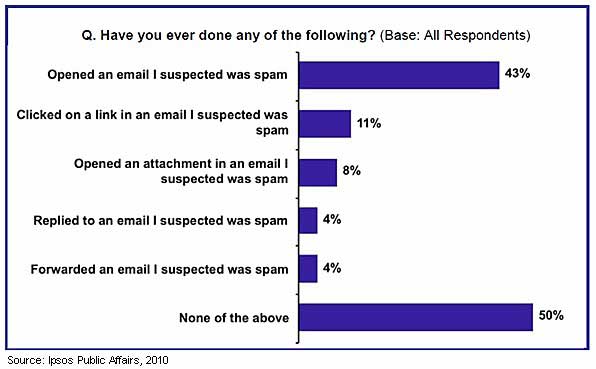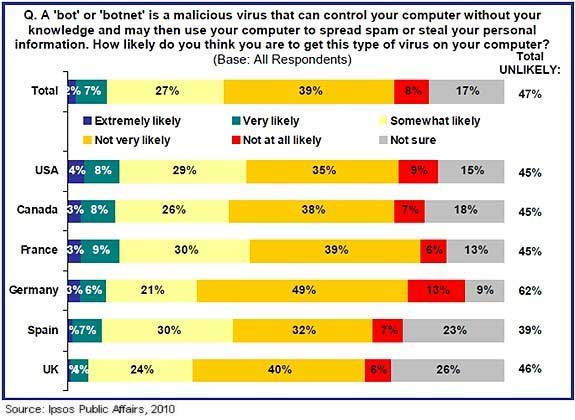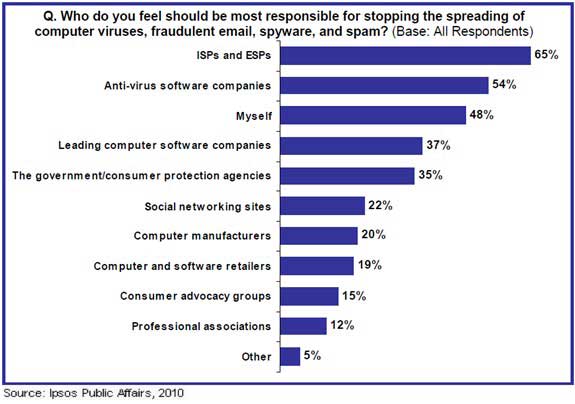Email users look for a variety of signs to identify spam in their inboxes: 75% look at senders' names or addresses and 67% look at subject lines, while approximately one-half cite unusual language, email content itself, spelling mistakes, or poor grammar as signs that email may be spam, according to Ipsos Public Affairs.
Six out of ten email users (61%) say they don't open email when they suspect it is spam. Some 44% move such email to their junk mail folder and 39% hit the "spam" button. Just 9% report the problem to their ISP (Internet service provider) or ESP (email service provider) and 7% do so to a government or reporting agency.
Nearly one-half (47%) of email users delete suspect email without flagging it as spam.
Below, other findings from the 2010 Messaging Anti-Abuse Working Group (MAAWG) Email Security Awareness and Usage Survey, a six-country study by Ipsos Public Affairs.
Nearly one-half (44%) of email users surveyed classify themselves as "somewhat experienced" with security on the Internet, including firewalls, spam, junk mail, and computer viruses.
Over one-third (36%) consider themselves "not very" or "not at all experienced," while 20% consider themselves "an expert" or "very experienced."
Who Is Opening Spam—and Why?
Some 43% of email users say they have opened an email they suspected was spam, though fewer have taken more risky behaviors such as clicking on a link (11%), opening an attachment (8%), replying to (4%), or forwarding (4%) an email they suspected was spam.

Those riskier behaviors are more common among men and email users under age 35—the same demographic groups that are more likely to consider themselves experienced when it comes to Internet security threats.
Nevertheless, younger users are less likely to open spam: 50% of email users under age 35 say they are unlikely to open spam, compared with 40% of those age 35-54 and 36% of those age 55+.
Among those who have opened a suspicious email, over half (57%) say they have done so because they weren't sure it was spam and 33% say they have done so by accident.
However, nearly half (46%) of email users say they have accessed spam intentionally—to unsubscribe or complain to the sender (25%), to see what would happen (18%), and to learn more about the products or services being offered (15%).
Email Preferences
Over eight in ten surveyed consumers (82%) say email from friends and family is extremely or very important. Email users also tend to place a great deal of importance on the following types of emails:
- Receipts or shipping details for purchases: 70%
- Notifications of bills to be paid: 64%
- Notifications from a bank or another financial institution: 58%
Email users attach less importance to the following types of emails:
- Newsletters: 20%
- Marketing materials: 15%
- Other emails they have subscribed to: 22%
Nearly one-half ( 46%) of email users say their anti-virus software is updated automatically; 33% say they do it themselves; 15% say someone else takes care of it; and just 2% say no one updates their anti-virus software.
Fully 58% of consumers surveyed say their computer has been affected by a virus.
Looking for solid, substantiated information about email from the industry's best resources? The 67-page Email Marketing Factbook featuring 39 charts tells you about email usage, what captures users' attention, and how organizations are using email to reach customers. This email factbook consists of chapters 1 & 2 from the larger Digital Marketing Factbook a 144-page compilation of data and 110 charts that also covers search engine marketing and social media.
Awareness, Concern About Bots Lagging
Despite the prevalence of viruses, less than half (47%) of email users say they have heard of the term "bot" or "botnet." However, most (84%) are aware of the concept of bots—malicious viruses that can control their computer without their knowledge and may then use their computer to spread spam or steal their personal information.
Though most users say their computer has been infected by a virus, only 36% say they are at least somewhat likely to get a bot on their computer and 47% say they are not very or not at all likely to get a bot.

Stopping Malware
Email users are most likely to hold ISPs and ESPs (65%) and anti-virus software
companies (54%) responsible stopping the spread of viruses, fraudulent email, spyware and spam:

Consumers tend to rate anti-virus software companies (67% very/fairly good) and themselves (56%) as performing best in stopping the spread of viruses, fraudulent email, spyware and spam.
By contrast, consumers tend to be most critical of government or consumer advocacy agencies (34% very/fairly poor) and social networking sites (34%).
About the data: Findings are from the 2010 MAAWG Email Security Awareness and Usage Survey conducted by Ipsos Public Affairs among 3,716 email users in the US, Canada, France, Germany, Spain, and UK, January 8-21, 2010.



